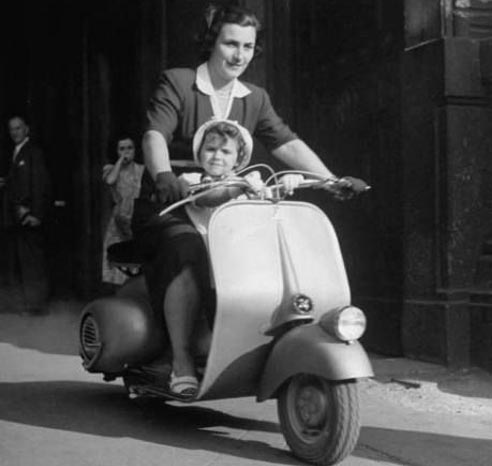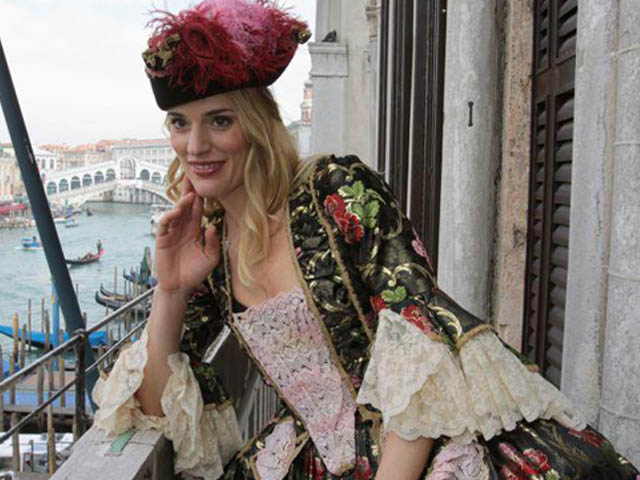
Ovunque vada, è sempre meglio con la mamma—soprattutto su una Vespa!
Wherever I Go, It’s Always Better with Mom—Especially on a Vespa Ride!
Con la mamma — le nostre avventure non finiscono mai!
With Mom — Our Adventures Never Stop!
Questo weekend in America celebriamo la Festa della Mamma, un’occasione per onorare le mamme con fiori, biglietti e tanto affetto. Di solito cade la seconda domenica di maggio, e le mamme vengono coccolate (e a volte anche viziatissime!). Io personalmente non vedo l’ora di gustare un delizioso pasto preparato da mio marito e dai miei figli. Dopo, i miei figli ed io ci lanceremo in qualche avventura—chi sa dove finiremo! Se solo avessi una Vespa per portarci in Italia e oltre!
This weekend in America, we celebrate Mother’s Day, a time to honor moms with flowers, cards, and lots of love. Traditionally, it falls on the second Sunday in May, and moms everywhere are pampered (and sometimes spoiled rotten!). Personally, I’m looking forward to a delicious meal cooked by my husband and kids. Afterward, the kids and I will head off on some adventures—who knows where we’ll end up! If only I had a Vespa to whisk us off to Italy and beyond!

Amore e Riconoscimento
Love, and Recognition
È bello per mamme come me avere un giorno di pausa—beh, più o meno. (Il lavoro di una mamma finisce mai davvero?) Vorrei ringraziare di cuore Anna Jarvis, un’ispirata donna americana che, nel 1908, decise che era ora di dire basta: le mamme meritano una pausa e un po’ di riconoscimento. Brava, Anna!
It’s nice for moms like me to have a day off—well, sort of. (Does a mother’s work ever really end?) I’d like to give a special shout-out to Anna Jarvis, an inspiring American woman who, in 1908, decided enough was enough: moms deserve a break and some recognition. Brava, Anna!
Da allora, la Festa della Mamma è cresciuta e si è trasformata in una grande celebrazione. Ecco una curiosità: lo sapevi che durante la Festa della Mamma si fanno più telefonate che in qualsiasi altro giorno dell’anno? Questi affettuosi colloqui con la mamma fanno aumentare il traffico telefonico fino al 37%! A quanto pare, tutti vogliono bene alla propria mamma un po’ di più nel giorno della sua festa. Boh!
Since then, Mother’s Day has blossomed into a major celebration. Here’s a fun fact: did you know more phone calls are made on Mother’s Day than on any other day of the year? These heartfelt holiday chats with Mom cause phone traffic to spike by as much as 37%! It seems everyone loves their mom a little extra on Mother’s Day. Boh!
Photo Credits: Photo 1 Leila Janah, Photo 2: Gonely.com, Photo 3 Pinterest Vintage Vespa Photos, Photo 4 Claudia Cardinale & Son, April 26, 1967
Le mamme italiane: Dai Fiori di Mimosa all’Influenza Americana
Italian Moms: From Mimosa Flowers to American Influence
In Italia, celebrare la Festa della Mamma a maggio è una tradizione relativamente recente. Per anni, gli italiani hanno celebrato La Festa della Donna (la Giornata Internazionale della Donna) l’8 marzo. In questa occasione, le donne ricevono fiori di mimosa gialla e vengono trattate come regine per un giorno. Durante gli anni del fascismo, il 24 dicembre fu designato come La Giornata Nazionale della Madre e del Fanciullo, scelto per la sua vicinanza al Natale.
In Italy, celebrating Mother’s Day in May is a relatively new tradition. For years, Italians have celebrated La Festa della Donna (International Women’s Day) on March 8th. On this day, women are gifted yellow mimosa flowers and treated like queens. During the Fascist years, December 24th was designated as La Giornata Nazionale della Madre e del Fanciullo (the National Day of Mothers and Children), chosen for its proximity to Christmas.
Tuttavia, negli anni ’50, gli italiani hanno iniziato ad adottare la tradizione americana di celebrare la Festa della Mamma a maggio. Ispirati dai vicini d’oltreoceano, gli italiani hanno abbracciato questa festa per motivi sia commerciali che religiosi. Come in America, i bambini regalano alle loro mamme piccoli doni, come disegni fatti a mano o lavoretti realizzati a scuola.
However, by the 1950s, Italians began to adopt the American tradition of celebrating Mother’s Day in May. Inspired by their transatlantic neighbors, Italians embraced the holiday for both commercial and religious reasons. As in America, children give their mothers small gifts—handmade designs or crafts from school are popular choices.

Festeggia la Tua Mamma in Grande Stile—Magari Anche su una Vespa!
Celebrate Your Mom in Style—Maybe Even on a Vespa!
A tutte le meravigliose mamme là fuori: buona e felice Festa della Mamma! E a tutti gli altri: cosa state aspettando? Chiamate la vostra mamma! O, ancora meglio, portatela a fare un giro in Vespa tra le colline ondulate d’Italia. Questo sì che sarebbe un ricordo indimenticabile!
To all the amazing mothers out there: have a wonderful and joyful Mother’s Day! And to everyone else: what are you waiting for? Call your mom! Or better yet, take her on a Vespa ride through the rolling hills of Italy. Now that’s a memory worth making!
Festebbiamo le mamme su un vespa di Lunapop
Vuole una Vespa per portarmi in Vacanza
A Fun Grammar Moment for Mother’s Day!
Since it’s Mother’s Day, let’s talk about some interesting
grammar rules related to family terms in Italian.
Referring to a single family member, you don’t use a definite article.
Tua sorella (your sister) is correct,
La tua sorella (the your sister) is incorrect.
However, if you’re talking about more than one
family member, you do use the definite article as usual:
Le tue sorelle (your sisters).
Exceptions to the Rule
This rule doesn’t apply if the single family member is modified in some
way—whether by an adjective, a prefix, a suffix, or if the possessive is loro.
In these cases, the definite article is required. Here are some examples:
Il mio caro cugino (my dear cousin – modified by the adjective caro).
La mia bisnonna (my great-grandmother – nonna is has prefix bis-).
Il mio fratellino (my little brother – fratello is modified by the suffix -ino).
La loro sorella (their sister – sorella is used with the possessive loro).
Affectionate Terms
There’s one more nuance worth mentioning: affectionate terms like mamma and papà. When you use the article (la mia mamma / il mio papà), it conveys extra warmth or affection, like saying “my dear mom” or “my beloved dad.” Without the article (mia mamma / mio papà), it simply identifies the relationship, as in “my mom” or “my dad.”
Here’s an example of how these rules play out in a real-life context:
La mia famiglia è molto grande.
(My family is very big.)
Mia madre ha sette fratelli e ho molti cugini.
(My mother has seven siblings, and I have many cousins.)
Non ho sorelle, ma ho due fratelli minori.
(I don’t have sisters, but I have two younger brothers.)
I miei genitori sono sposati dal 1979.
(My parents have been married since 1979.)
Adesso ho anche due cognate.
(Now I also have two sisters-in-law.)
Non ho ancora nipoti.
(I don’t have nieces or nephews yet.)
La mia mamma mi vuole bene.
(My dear mom loves me.)
Ora che conosci questi suggerimenti, vai a impressionare
la tua mamma con le tue abilità in italiano!
Now that you know these tips, go impress
la tua mamma with your Italian skills!















Chi sono le donne nelle foto? La prima la so, è Claudia Cardinale.
Ben fatto! mi piace la musica del Ladyvette, molto divertenti!